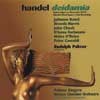Handel Deidamia
A first recording of Handel’s last opera – by no means his greatest but full of his characteristic flair and imagination
View record and artist detailsRecord and Artist Details
Composer or Director: George Frideric Handel
Genre:
Opera
Label: Troy
Magazine Review Date: 3/2002
Media Format: CD or Download
Media Runtime: 199
Mastering:
Stereo
DDD
Catalogue Number: TROY460

Tracks:
| Composition | Artist Credit |
|---|---|
| Deidamia |
George Frideric Handel, Composer
Brenda Harris, Ulisse, Mezzo soprano Brewer Chamber Orchestra D'Anna Fortunato, Achille, Soprano Edward Brewer, Harpsichord George Frideric Handel, Composer John Cheek, Lycomede, Bass Julianne Baird, Deidamia, Soprano Máire O'Brien, Neraea, Soprano Palmer Singers Peter Castaldi, Fenice, Bass Rudolph Palmer, Conductor |
Author:
Deidamia‚ Handel’s final opera‚ was composed in 1740 – his last major work before Messiah – and performed‚ just three times‚ early the next year: then it entered virtual oblivion until its first modern revival in 1953‚ in Germany‚ and its staging in London two years later as the inaugural production of the Handel Opera Society. Don’t seek in it the wisdom of a Zauberflöte‚ a Parsifal or a Falstaff. But don’t write it off too readily either. The libretto is on the story of the young Achilles‚ concealed and disguised as a girl at the court of King Lycomedes of Scyros to avoid going to Troy where his death has been predicted. He is eventually identified by the crafty Greek kings‚ with Ulysses to the fore‚ and departs with them‚ leaving his lover the princess Deidamia heartbroken. Some writers on the work have seen comic elements in it‚ and of course transsexual disguises often carry comic hints‚ especially to camp theatrical humourists; but on hearing it decently performed‚ as it is here‚ I am not at all sure that Handel himself was conscious of anything comic about it.
The opera was written for a rather mixed group of singers performing in a small theatre; that‚ and the impact of the new operatic styles of the 1730s‚ affected the way Handel composed the piece. The expansive‚ longbreathed lines of the great heroic works give way here to shorter phrases‚ perky rhythms and lighter textures‚ and almost all the arias are accompanied by just the violins and continuo. There isn’t quite the range or variety of styles that you find in most of his operas‚ and that affects the treatment of character. But the situations are ingeniously contrived to allow scope for varied music: rather oddly at the end‚ where a twist in the plot allows Ulysses rather than Achilles to sing the final duet with Deidamia‚ as it has to go to the prima donna and the primo uomo (this‚ the only duet in the opera‚ is in fact a particularly fine and artfully written piece).
This group of performers‚ or more or less this group‚ gathered by John Ostendorf‚ have made CDs of several of the less familiar Handel operas. The jewel in their crown is certainly Julianne Baird‚ whose voice is as pure and appealing as ever‚ and who has the technique to cope with some very demanding fioritura‚ and who phrases with consummate musicianship. She brings the necessary bite to the angry ‘Va‚ perfido’ at the end of Act 2 and passion and tragic intensity to the two expressions of grief‚ of which ‘M’ai resa infelice’‚ a twotempo aria‚ is quite outstanding. Another habitué of this series is D’Anna Fortunato‚ who gives a very capable account of Achilles’ music even if there are some challenging moments in her second Act 1 aria. As Ulysses‚ Brenda Harris shows a clear and firm voice‚ ideal for castrato roles: she shines in the aria at the end of Act 1‚ with shapely and poised singing‚ and does pretty well in the big Act 2 showpiece. Máire O’Brien sings Deidamia’s confidante‚ Neraea‚ with considerable charms and a pleasant‚ gentle ring to the voice; Handel wrote three of her arias twice over‚ and for some reason the simpler versions‚ which he did not use‚ are preferred here (it would have been a good idea at least to give the others in an appendix). There are two good basses: John Cheek‚ who brings some depth of tone to Lycomedes’ music‚ and Peter Castaldi‚ warm and clear of diction as Phoenix.
Rudolph Palmer’s conducting is careful‚ conservative in style‚ sensible over tempo‚ and not specially energetic or always observant of Handel’s dynamic indications. I do not know why he uses dotted rhythms in the Italianstyle sinfonias at the beginnings of Acts 2 and 3. He allows elaboration of da capo sections‚ although some of it is arbitrary rewriting rather than true decoration. Recitatives are carefully paced. The booklet translation is not always quite accurate. But I am glad to have this first CD recording of the work‚ by no means one of the finest Handel operas but still with a great deal of splendid and characteristic music.
Discover the world's largest classical music catalogue with Presto Music.

Gramophone Digital Club
- Digital Edition
- Digital Archive
- Reviews Database
- Full website access
From £8.75 / month
Subscribe
Gramophone Full Club
- Print Edition
- Digital Edition
- Digital Archive
- Reviews Database
- Full website access
From £11.00 / month
Subscribe
If you are a library, university or other organisation that would be interested in an institutional subscription to Gramophone please click here for further information.




